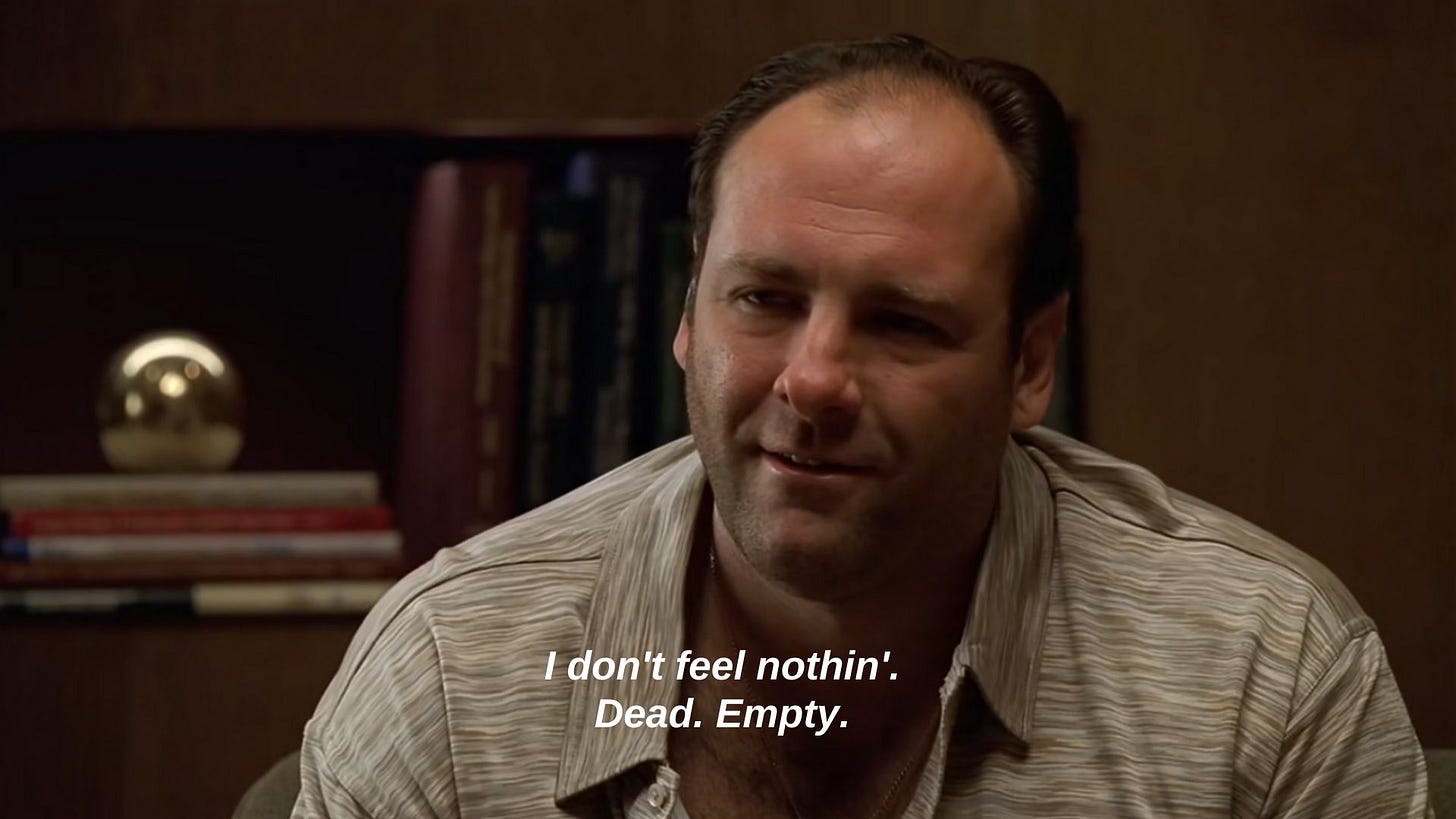you, me, and bpd
Celeste gets to have a new diagnosis, as a treat
First of all - apologies for the two month hiatus. I had a mental health! I love all of you and thanks for sticking by my silly little newsletter. You’re all the best!
Earlier this year, I did something that we who are internet-literate know we should never do.
I googled my symptoms.
Don’t worry, this wasn’t me misinterpreting a sore throat or upset stomach as cancer and therefore certain death. Those days of trying to get out of lessons at school are over.
No, dear reader, instead I sat down with my therapist, around the time of my 30th birthday and said “I think I have BPD.” Her reaction was to take a long pause, and then say “let’s talk about that next time”, which translates to “yeah that sounds pretty plausible.” Yikes.
So it finally happened, I got one of those special non-generic diagnoses that is considered scary and undesirable, dripping in stigma which will brand me as crazy. Everyone is depressed and anxious these days. How could anyone not be. Neurodivergence is becoming more widespread and accepted due to greater access to resources and information. And is it any wonder that our brains, designed for foraging berries, making cave paintings, and dancing around the maypole, are frazzled by, well, everything? Memes and funny tropes make conditions like ADHD relatable and help those affected feel seen, after years of being told that they really ought to just pay attention and snap out of it.
BPD - borderline personality disorder - isn’t cute or relatable or kooky. It happens either through trauma or through genetics. It was the former in my case, when trauma in childhood affects the development of your personality and how you experience emotions. Children in loving and abuse-free homes have the freedom and the space to develop their personalities in a safe environment, learning how to experience and cope with emotions in a healthy way. Sure, some emotions are hard to deal with, like fear or anger or sadness, but they are able to contextualise them and react in a proportional way with the help of loving and supportive caregivers who are committed to their development.
Children experiencing trauma, abuse, and neglect have this process of development interrupted. Instead of learning how to cope with difficult emotions in a healthy way, we just have to learn to cope with all of the difficult, painful, unexpected, unexplainable things that should not be happening to us - alone. We try to shield ourselves from our surroundings and push through it, we block out pain and often just try to keep going, as we don’t have the space or opportunity to confront what is causing us distress. This means we never learn how to manage intense and difficult emotions. Adults around us are unable or unwilling to help, either because they cannot provide care or because whatever it is that is traumatising us is traumatising them too. Hurt adults raise hurt children. This is, and I cannot stress this enough, not the fault of the child. Adults cause trauma in children, whether they mean to or not, and their actions leave us struggling to cope as we grow up. We are then branded as difficult, impulsive, emotional, out of control, while the adult who did this to us walks away unscathed, or continue to cause harm in refusing to seek help for themselves. People of our parents’ generation think that mental health only happens to young people, if they believe in it at all. They think you reach a certain age where you’re beyond help and use it as an excuse to not seek any.
(Yes I know it can be genetic, but I don’t know anything about this, so we’re just talking trauma here today.)
Plenty of people have issues with the diagnosis itself, and it’s easy to see why. The deep complexities of the human mind and uniquely different experiences felt by millions of people cannot be compartmentalised into neat diagnoses. Except that they can, and they are, and it’s called the Diagnostic and Statistical Manual of Mental Disorders (DSM). Originally meant for identifying what treatment may benefit a patient, it is now used to label people with endless amounts of acronyms and pigeonhole deeply damaged and traumatised people into tidy little categories as they are shepherded through the abattoir of treatment.
In a way, I am rather lucky as I have never been personally attacked by the DSM and have always found the treatment I needed. I like to think of myself as “advanced mentally ill”, which means I can quite soberly and eloquently explain myself and that I am also very demanding and well informed about the treatment that I need. It also means that I am “normal passing” and seem more or less pretty ok to the people around me. This is a result of having been in therapy for 20 years and having experienced such undeniable trauma that no mental health professional would just brush it off and tell me I’m being hysterical. In a twisted way, it’s a privilege; my experiences are so fucked up that everyone takes me seriously but I’m not so fucked up enough that people don’t believe me. This helps as well. Yay?
So I find myself on the Wikipedia page for borderline personality disorder and scan the list of symptoms.
Frantic efforts to avoid real or imagined abandonment - tick
Unstable and chaotic interpersonal relationships, often characterised by alternating between extremes of idealisation and devaluation, also known as "splitting" - tick
Markedly disturbed sense of identity and distorted self-image - tick
Impulsive or reckless behaviours (e.g., uncontrollable spending, unsafe sex, substance use disorders, reckless driving, binge eating) - actually not this one, thank god. I turned out very boring in that regard
Recurrent suicidal ideation or self harm - I mean yeah, I’m not the world’s biggest fan of being alive
Rapidly shifting intense emotional dysregulation - BIG TICK
Chronic feelings of emptiness - tick tick tick
Inappropriate, intense anger that can be difficult to control - tick
Transient, stress-related paranoid or severe dissociative symptoms - tickety tick tick tick
Does it mean I actually have this condition that’s been dreamt up by doctors somewhere? Does it mean anything? Does it help me knowing that these behaviours that I’ve exhibited my entire life can be grouped together in an acronym?
It doesn’t for everyone. My internet friend Sammy Trotman has an excellent theatre show about it called That’s Not My Name (reviewed here in The Play’s the Thing and here by my favourite substacker and lovely friend Clara). But for me it does. Does it make it easier to understand? Yes. Does it make it easier to deal with? Absolutely not. If anything, I feel dumber than ever. At least before it was a hurricane of feelings that felt out of control and unexplainable. At least then I knew that there was a line between ~childhood trauma~ and ~adult fuckedupness~ with a giant crayon scribble in the middle. No, now I know it’s “a thing” and I feel really fucking stupid that simply understanding why my brain does things makes it no easier to stop my brain doing those things. So now I watch myself have meltdowns and lose control of my emotions and lie in bed for days, from the control room in my brain, and the guy at the controls is clutching his temple going “for fuck’s sake Celeste, we’ve been over this…”
I mean really it does help. One of the few things diagnoses are good for is connecting you to treatment that can help, which I’m on a waiting list for. I know that my ability to access treatment and therapy and medicine and support makes me one of the lucky ones. It also makes me painfully self-aware and forces me to relive and re-contextualise my experiences with the new information I’ve gained. Realising that the adults around me when I was young were deeply hurt, troubled, and damaged is heartbreaking; realising that they never sought help (while insisting that I did) is unbelievably frustrating. I was sent to therapy from a young age and my psychiatric recovery was always a priority. This is obviously not a bad thing. Yet no one ever realised that everyone needed to heal and just fixing me wouldn’t fix everyone and everything else.
This hyperfocus on my therapy has also affected how I ask for help as an adult. When something bad happens, who do I call? It’s not my family, or my friends. I email my therapist and ask to talk. I call my GP and ask for help. I’ve been trained to ask medical professional for help with personal problems and that reaching out to my friends feels inappropriate. Why do they care? Maybe they… love me? And want me to be ok?
I’m getting better at it. I’m trying to focus on being painfully honest when people ask me how I am - because people want to help. People appreciate the truth and I’m not a burden. I have never had a friend complain or chastise me for getting in touch. If anything, I know it’s sad for them to know I’m not doing ok. So I’m going to try and call my friends more.
In the meantime I can do my homework and compartmentalise my reactions and pat myself on the back for being aware of my behaviour whilst grumbling that awareness doesn’t get me that far. It’s weights on me a lot that I will never be “better” and that I’m stuck with this for life, and that others did this to me. I’m glad that the narrative is moving away from being “cured” of mental illness (maybe some people can be - for those like me who are in it for life, it can be painful reminding people that there is no cure). It’s just about working with what I’ve got and what I can realistically achieve. Full time sad gals like me just want a bit of peace and quiet, and stability, and love, and friendship, and kindness, and hope. It’s a pretty simple list of demands.




This was such a cogent, absorbing, and moving thing to read. Thank you.
Love you, miss you, always here for you no matter what, and incredibly proud of you always ❤️